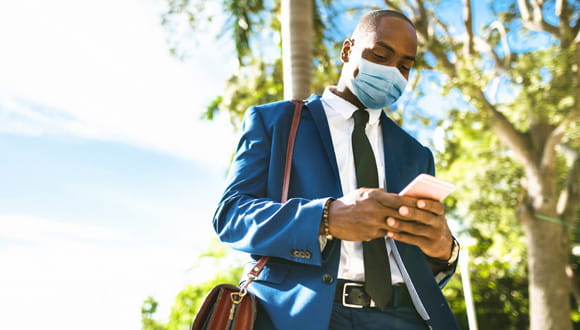3 Things to Know About Life After Recovering From COVID-19
Jan. 5, 2022 - Katie McCallumWhen your COVID-19 symptoms were at their worst, you were probably solely focused on the basics: resting, hydrating and monitoring yourself for worsening symptoms.
Now, as your road to recovery becomes clearer and clearer, you may be wondering what comes next after your symptoms subside. Unlike the common illnesses you're used to, like a cold or the flu, COVID-19 comes with a few extra question marks.
How long will I be contagious? Should I be worried about these lingering symptoms? Does this mean I don't have to a booster shot?
Here to help you understand what life looks like after recovering from COVID-19 is Dr. Joshua Septimus, associate professor of clinical medicine and medical director of Houston Methodist Primary Care Group Same Day Clinics.
Don't leave home while you're still contagious
A person with COVID-19 is thought to be most contagious in the days immediately leading up to symptom onset (aka, the presymptomatic period) and throughout the first five days of his or her symptoms.
But, it can take several more days for a person's immune system to actually clear the virus from the body.
"Most studies show that by the end of 10 days of infection, your body has cleared the active virus," says Dr. Septimus. "A person with COVID-19 is likely no longer contagious after 10 days have passed since testing positive for coronavirus, and 72 hours after resolution of his or her respiratory symptoms and fever."
When it comes to staying home long enough to ensure you're no longer contagious, be sure to follow the CDC's isolation guidelines. Completing your isolation, even if you're asymptomatic or your symptoms are clearing up and you're feeling better, is imperative to ensure you don't spread COVID-19 to others.
Some symptoms may last longer than you'd like
COVID-19 comes with a pretty long list of symptoms — the most common being fever, dry cough and shortness of breath.
Both the severity and duration of these symptoms vary from person to person, but some symptoms are more likely to last well into your recovery period.
"Some symptoms of COVID-19 linger longer than others," says Dr. Septimus. "In particular, fatigue and loss of taste and smell can persist beyond the period of contagion."
While uncomfortable and/or inconvenient, Dr. Septimus adds that these lingering symptoms aren't too worrisome for most people.
You still need to get vaccinated or get your booster
Immunity is complicated and, yes, you can still get reinfected with COVID-19.
What does this mean for you?
Even after recovering from COVID-19, it's imperative that you stay up-to-date on the COVID-19 vaccinations that help keep you safe from experiencing severe symptoms should you be infected again in the future.
If you're unvaccinated and need to start your primary vaccine series, it's recommended that you get your first shot once your symptoms have resolved and you've met the criteria to end isolation.
If you're eligible and due for a COVID booster shot, the CDC states that people recently infected with COVID-19 may wait at least three months post-infection before getting the omicron booster. However, individual factors such as risk of severe COVID-19 disease or community outbreaks should be taken into account when determining timing of booster vaccination after infection. (Related: How Effective Is the Updated Booster Against Omicron? & 5 More Questions, Answered)
"The universal precautions that help prevent the spread of COVID-19 are just that — universal," Dr. Septimus adds. "We're all in this together, and we're all responsible for keeping our community safe. Each and every one of us needs to take these precautions seriously, regardless of whether you've already had COVID-19 or not."
If you need a COVID-19 vaccine or booster, you can schedule an appointment with a primary care doctor near you or get vaccinated at a local pharmacy.








